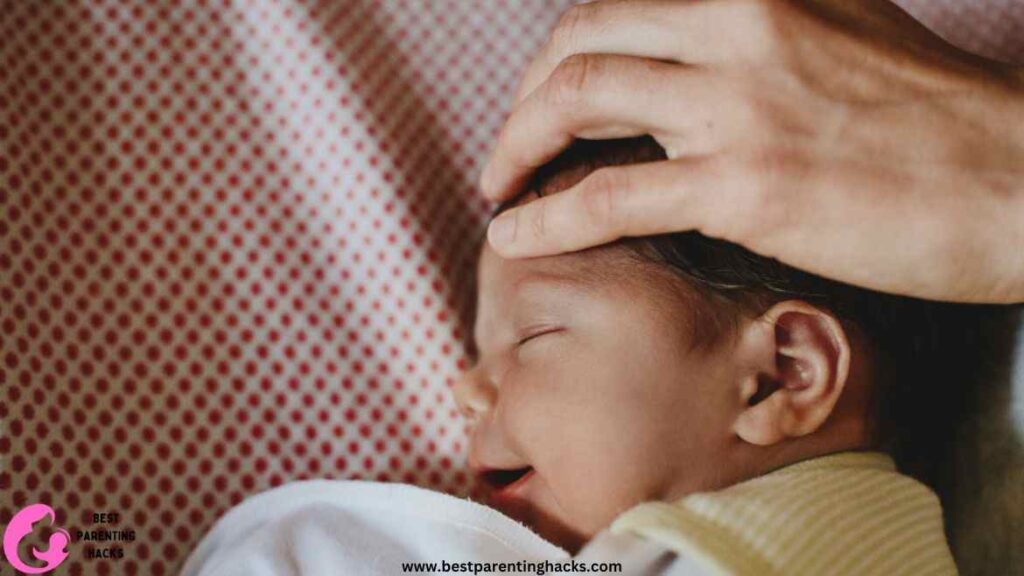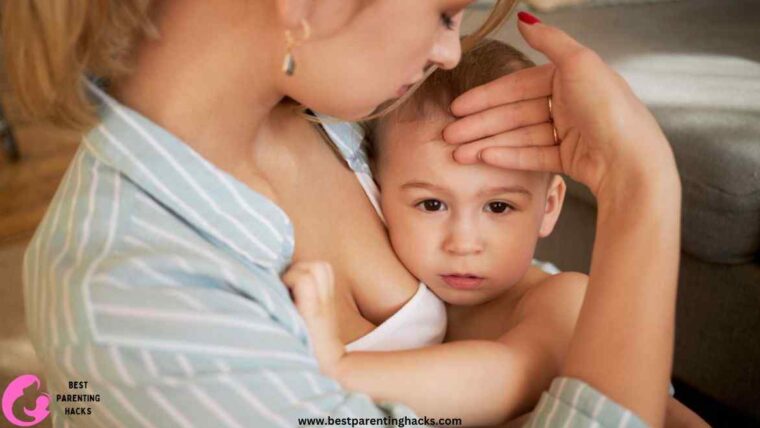Table of Contents
Being a parent, I’ve always found the wide range of behaviors displayed by newborns to be both fascinating and occasionally confusing, especially when it comes to their seemingly innate tendencies. A common activity that many parents, myself included, notice is when a baby rubs their head, especially when they seem sleepy. Even if this activity seems little, many others may be curious or concerned about it. I have realized as a parent that these seemingly small behaviors and gestures often act as portals into our infants’ growing worlds, showing us their needs, and discomforts and even shaping their personalities. We need to understand these actions so that our children are safe and comfortable and in doing so, we also ease some of our parental concerns.
The solution to the headline question, “Why do babies scratch their heads when tired?” is a mix of developmental and physiological causes. In their quest for development and sensory exploration, babies frequently utilize head scratching as a coping mechanism for a variety of bodily experiences. When they are weary, this behavior is especially apparent because their bodies go from an active to a more relaxed state, which alters sensory perception. Therefore, even though this behavior could first appear worrying, it is usually a normal aspect of a baby’s growth.

Common Causes for Head Scratching in Babies
There are a few different things that might cause newborns to itch their heads. I’ve learned as a parent to see past outward manifestations to determine the potential cause of this behavior.
1. Ear Discomfort or Infections: Infants may scratch their heads as a result of ear pain. Ear infections, which are frequent in infants, or even just an accumulation of earwax might be the cause of this.
2. Teething Pain: When teething causes pain and discomfort that sometimes spreads to the head and ears, newborns may often scratch those places to ease their agony.
3. Skin Conditions: Babies may scratch their heads due to itching brought on by conditions like eczema or a dry scalp. Babies frequently have these skin conditions because of their delicate skin.
4. Environmental Factors: A baby’s skin may become uncomfortable and scratchy due to environmental changes, such as a new washing detergent, the kind of clothing, or even the weather.
5. Allergies: Babies may scratch their heads due to skin irritations brought on by allergic responses to food or outside substances like pollen or pet dander.
You Might Also Like to Read: Why is My Baby So Serious?
Understanding the Behavior: Why Babies Scratch Their Heads
With their fast-growing senses, babies frequently display actions that are an attempt to make sense of the world around them. As a mom, I’ve noticed that newborns’ sensory systems begin to shut down as they go to sleep. There are instances when this shift gives you tingles or itches, which makes you scratch your head. Their little bodies seem to be seeking solace in this newfound condition of rest. It can also be a self-soothing mechanism, similar to how adults wipe their eyes when they’re fatigued. Observing these little organisms create their systems for comfort is intriguing.
Additionally, since infants are always learning about their bodies and the outside world, scratching their heads may be a natural part of this exploration. This is how they discover different feelings and how to respond to them. This activity also signifies the progress of their motor skills because as they become more coordinated, a child’s aptitude for reaching out to explore diverse body parts also increases.
1. Sensory Processing: Babies altered sensory processing throughout the sleep-wake phase can cause physical feelings such as tingling or itching on the scalp.
2. Self-Soothing: Babies may calm themselves, particularly when they’re feeling stressed or exhausted, by scratching their heads, much like they can with their thumbs, or by clinging to a blanket.
3. Discovery and Exploration: Infants have an innate curiosity for their bodies. They use scratching their heads to investigate and comprehend various aspects of themselves.
4. Motor Skill Development: Babies become more adept at controlling their movements as they become older. These motor skills can be practiced by scratching their head, and this can aid them in understanding and controlling themselves better.
You Might Also Like to Read: What to Do When a Baby Not Eating After Circumcision?

The Link Between Fatigue and Increased Scratching
My experience has shown me that when my kid is sleepy, they tend to itch their head more. The finding is consistent with the premise that an infant’s body responds to fatigue in various manners such as enhanced sensitivity of the skin. The impulse to scratch may result from this increased sensitivity. It’s as though their bodies are attempting to trigger a sensory reaction to keep them awake.
1. Increased Sensory Sensitivity: Babies may scratch their heads due to feelings on their skin becoming more sensitive as they become sleepy.
2. Self-Soothing in Sleep Transition: Babies may use scratching as a means of self-soothing throughout the shift from awake to sleep.
3. Physical Response to Fatigue: Physical exhaustion can take many forms, such as a heightened desire for comfort, which they may achieve via scratching.
4. Distraction from Sleepiness: Scratching might occasionally be a subconscious attempt to divert attention away from sensations of fatigue.
5. Habit Formation: A baby’s tendency to scratch their head when they’re fatigued may develop over time.

When to Be Concerned: Identifying Excessive Scratching
Parents must distinguish between typical behaviors and those that might point to a problem. While the odd scratch is natural, frequent or severe scratching may indicate pain or a more serious problem.
1. Frequency and Intensity: It’s concerning if the scratching occurs frequently or intensely enough to result in cuts or redness.
2. Accompanying Symptoms: Keep an eye out for symptoms such as rash, extreme fussiness, irregular sleep patterns, or infection indicators.
3. Disruption to Daily Activities: Scratching that is severe enough to interfere with sleep or daily activities needs to be looked at more.
4. No Improvement with Basic Care: It may be necessary to see a pediatrician if frequent moisturizing and other basic care measures are ineffective in stopping the itching.

Practical Tips to Reduce and Manage Head Scratching
I’ve discovered several useful strategies to control and lessen my baby’s head-scratching behavior throughout my parenting adventure.
1. Keeping Nails Trimmed: If you regularly clip your baby’s nails, it will help shield them from self-harm accidents.
2. Using Mittens and Soft Caps: Soft barriers, such as gloves or hats, might assist stop scratching, especially when you’re sleeping.
3. Comfortable Sleep Environment: Reducing the discomfort that triggers scratching may be achieved by creating a relaxing sleeping environment.
4. Right Skincare Products: You may avoid skin irritation by using hypoallergenic and mild infant products.
5. Soothing Distractions: You may assist your infant resist the temptation to itch by involving them in calm activities.

Conclusion
When I think back on my experiences and the lessons I’ve learned, it’s evident that while head-scratching by babies—especially when they’re sleepy—is often a normal developmental stage, it’s important for us parents to understand why it happens and when to get worried. Parents need to be alert and informed, by noticing repetitions, ensuring the child’s ease, and taking him to the hospital when necessary. Each child is unique, which extends to their exploration of life. The trick to being a great mom or dad is listening to your instincts and not hesitating to seek assistance in times of need. Parenting is, after all, essentially about loving, learning, and changing at every turn.
FAQs
1. My infant scratches their head more while they are teething. Why?
Babies may scratch their heads in reaction to pain and heightened sensory sensitivity brought on by teething.
2. Would my infant scratch their head more if they had a fever?
Yes, a fever makes you feel more uncomfortable and sensitive overall, which may cause you to scratch your head more frequently.
3. Are some skincare or hair products more likely to make newborns itch their heads?
Items containing colors and scents, that irritate the skin, can make it uncomfortable and cause it to itch.
4. Is my baby’s frequency of head scratching influenced by the weather?
Yes, temperature variations, such as hot or cold, can affect your baby’s skin and cause them to scratch more.
5. Can babies who wear hats or other headgear scratch their heads more frequently?
More head scratching may result from uncomfortable headgear that is overly tight or composed of abrasive materials.
6. When do infants usually outgrow the period of scratching their heads?
Though it might vary, most newborns typically outgrow this practice by their first year of life.
7. Is my infant clawing his head because he’s dehydrated?
Dehydration can cause dry skin, which might make your baby’s head scratch since it can be irritating and itchy.




